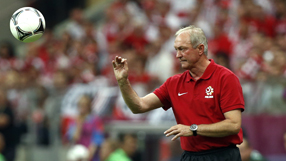Unyielding Smuda silences Poland doubters
It was only a 1-1 draw in their second Euro 2012 Group A match against Russia, but in one fell swoop Polish coach Franciszek Smuda silenced his critics.

The solid defence and counter-attacking approach with which the hosts came back in the second half of Tuesday's politically-charged clash was straight out of the textbook from Poland's golden years in the 1970s and 80s.
But it owed everything to the coach's decision to sacrifice winger Maciej Rybus in favour of playing former centre-back Dariusz Dudka in a midfield that broke up Russian attacks time and again.
The result was a shot count for the Poles that was almost double that of one of the tournament favourites and it left most of a notoriously critical Polish press core walking on air.
For the first time since 1986, most were quick to say, Poland still have a chance of advancing to the next stage at a finals going into the third group game.
"Very clearly the best match so far under Smuda, maybe the best match by the Polish national team in years," leading football columnist Robert Blonski said.
"At last we get a third game that means something."
It was all a sharp contrast to the reaction to the opening 1-1 draw with Greece which left most Polish commentators laying into Smuda for not making more changes as his side flagged in the second half.
Get FourFourTwo Newsletter
The best features, fun and footballing quizzes, straight to your inbox every week.
Smuda's reaction, as so often with a coach who prides himself on sticking to what he believes, was unyielding.
"I have my principles, they always turn out to be the right ones and I always come out smelling of roses," he told reporters on Saturday. "Why should I do what someone else suggests. I have to do what I want to do."
As interesting, though, was Smuda's refusal to sign up to the press optimism on Tuesday.
"We have played a lot of good games. Someone said to me that the best was [a 2-2 draw last year] against the Germans. I don't know about that. When you are building a team, not all of the performances in friendlies are the best.
"What I can say is that this team is playing better and better."
ECCENTRI DISCIPLINARIAN
Often an eccentric disciplinarian, Smuda has always divided opinion in Poland. But on a number of counts he is the country's most successful coach in international competition since a national team led by Zbigniew Boniek came third in the 1982 World Cup.
His 1997 Widzew Lodz side are the last Polish team to play in the Champions League group stages and a Lech Poznan team that included a handful of the current national squad were the first to make the Europa League knockout stages.
In many ways, the Poles now look similar to Smuda's multi-national Lech side. The coach, who spent his early years as a coach in the German lower leagues, began his reign two years ago by scouring the Bundesliga and other European leagues for players with Polish heritage.
The result is another multi-national ensemble, half of whom could just as well be playing for France and Germany.
All that, along with many Poles' grumbles that Smuda seems to speak German as well as he does Polish, has gone by the wayside for a nation that expects victory
